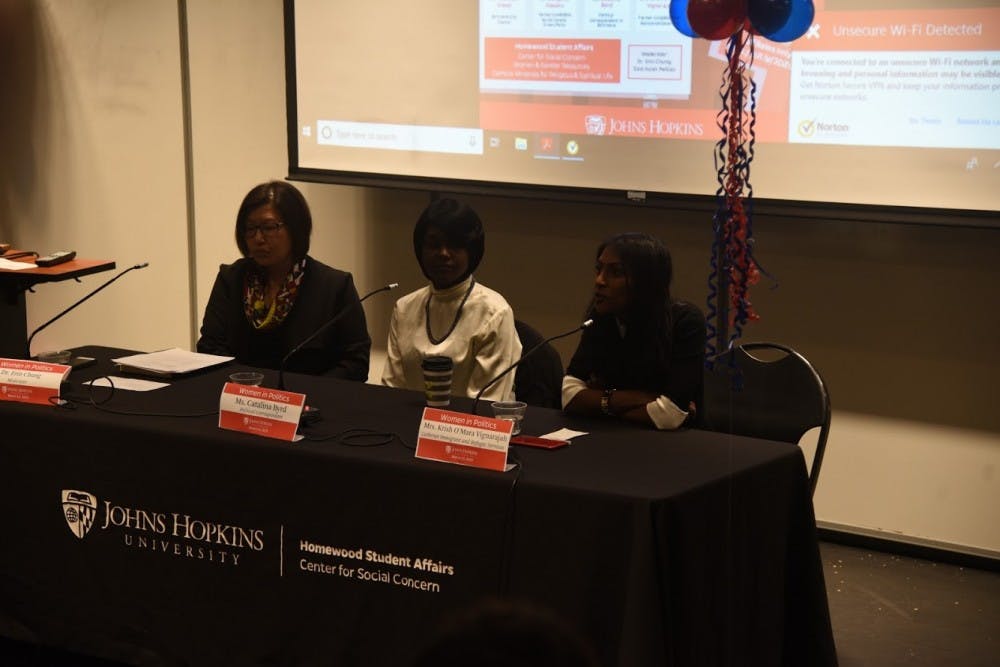The Center for Social Concern (CSC), Campus Ministries and the Women and Gender Resources Office co-hosted a panel on women’s representation in politics in Arellano Theater on Wednesday. The speakers included former Baltimore mayoral candidate Catalina Byrd and former Democratic candidate for governor of Maryland Krish O’Mara Vignarajah.
Margaret Flowers, a former Maryland Green Party candidate for the U.S. Senate, and Baltimore City Councilwoman Shannon Sneed were scheduled to attend but had prior commitments. The panel was moderated by Erin Chung, an associate professor in the department of Political Science.
Shawntay Stocks, assistant director at the CSC, said that the goal of the event was to inspire and inform students about civic engagement, especially women and people of color.
“We wanted students to think about pathways to engagement. We wanted students to think about civic engagement and to be involved in the civic process, with voting, with advocacy,” she said.
Stocks expressed that the choice of panelists provided a diverse set of opinions for the event.
“We also wanted to have a range from progressive to conservative, so that students hear a diversity of ideas and a multiplicity of political identities,” she said.
The discussion began with the early lives of both Byrd and Vignarajah and their introduction into civic service. The panelists discussed different outreach efforts, such as Hip Hop Caucus, a carpool karaoke outreach event that encourages young people to vote. Byrd also discussed her talk show, On Point. She said that she encourages a spectrum of politically diverse guests on her show.
Both Byrd and Vignarajah shared their experiences as female candidates for political office and the challenges they faced. The panelists noted a sexist double standard in many issues, such as parenting and work-life balance. Byrd and Vignarajah concluded the panel by addressing a variety of pressing issues facing women in politics and answered audience questions.
Emily Brothwood, an exchange student, attended the event because she is working on a thesis related to women in politics. She thought that both the panelists had interesting perspectives on motherhood and its influence on their political careers.
“It’s quite interesting... how much they speak about motherhood and what that gives them, what that provides for them within the political sphere, and also how similar they sound yet they’re from different political parties,” she said.
Riko Yuji, an exchange student, found that the most interesting part of the panel was the discussion of bringing children along during campaign events.
“It was quite insightful for me that they bring children to their rallies and campaigns, and they were very happy about that, because in Japan you have to leave your child back at home and then you have to focus on work,” she said.
Vignarajah stated that she hoped that female audience members would be inspired to become involved in politics.
“Don’t hesitate to get in the game. My path is evidence that you don’t have to be born and bred in politics to get off the sidelines and get into the arena, and I think that it’s more important now than ever to realize that there’s so many voices that aren’t being heard,” she said.
Byrd also wanted to empower women to become more politically active. She hoped that her views would broaden the perspectives of the panel.
“What I hoped that I brought to the table was some diversity and background, that it wasn’t all from one perspective in terms of partisanship, and just to the women in the audience who are students who think that they want to go into politics,” she said.
Graduate student Richard Elliott thought that the event was important for male audience members because it gave insight into the struggles of female political candidates that are often not as obvious to men.
“What I found most interesting were the ways in which they described sexism operating within the electoral framework in ways that I wouldn’t think about because they don’t affect me,“ he said. “Now they’ve told me these things, I can be more aware of them.”
Nevertheless, many students noted that there was a relatively small turnout for the event. Elliott believed that the topic was interesting and would appeal to a large number of students.
“I know there are women at this school who’d love to be involved in politics,” he said.





